I have battled in my mind a lot on whether or not I ever thought I would write about this. Was it something I wanted others to know? Was it going to look like a cry for attention? Would people think of me as weak (my actual biggest fear due to my obsession with perfection)? But as something that controls my thoughts and actions constantly, I want to share this intimate part of me with others, and I don’t want to feel the shame of my struggles.
I was sitting in an identity workshop a few weeks ago and was internally reflecting on what my identities were. The obvious ones came to mind easily, I am a white, cis-gendered, hetero female. But reflecting further beyond the things society has taught us to put an easy label on, my mind kept circuling to one central thought of who I am. I am someone who lives with eating disorders.
The whole story of my journey with body dysmorphia, obsession over how I am percieved, my need for control, and the actions indicative of eating disorders is impossible to share in one blog post. To complete the full story of why, we would have to start at the beginning of my life, but I could write a whole other blog post about that. I’ll briefly talk about my childhood and when things started, but mostly, I am going to share how I cope, what I struggle with, and how seeing a professional and opening up to those who love me has helped me grow stronger.
Since I was young, I have fantasized the idea of death in my mind. I was never seen as a sad kid/teen/adult, in fact I am usually known for being quite the opposite. Loud and energetic are the two most common words I hear used to describe me. However, in the middle of my sophomore year of college, this thought of death was the thing that took up all of my thoughts. I would have anxiety attacks extremely often, miss class because I did not want to get out of bed, convince myself those around me hated me, and most importantly make lists, sometimes in my head, other times in the notes section of my phone, of reasons why those around me should hate and why I hate myself. One of my close friends, Lauren, encouraged me to sign up to go to counseling. Others had mentioned it before, but having this close friend constantly be pushing me to take that step helped me realize someone DID care about me. It was then that these thoughts that I had thought were normal, were not. I was diagnosed with anxiety and depression, and as I eventually divulged more in therapy, I was referred to another counseling center that specialized in eating disorders.
I had been purging since I was a sophomore in high school, restricting my diet and obsessing over calories in silence since I was 13, but I would have never thought that I would actually be told one day, “You have an eating disorder”, let alone did I think I would hear “You fit the descriptions of three different eating disorders”. After hearing these words, it was like so many puzzle pieces fell together. It made sense to me that I would get so many cavities. It made sense to me that I always had acid reflux. It made sense to me that I would get hiccups everytime I ate because I would eat my food so fast. Later in therapy I learned more about body dysmorphia and how it has been controlling my life since elementary school.
Through all of these diagnoses being thrown my way, it offered me an answer I had been wanting. WHY. Why did I struggle so much with this. It simultaneously offered me comfort of having an answer while also making me feel weak and ashamed. The shame came mostly from the same origins as the eating disorders themself, I wanted to be perfect, and I wanted to be in control of what others thought of me. I slowly started to share with those close to me, and the responses made things feel better and some made things worse. “I don’t see you struggling with that”, “I have never seen you not eat”, “We don’t see you doing those things around us”. Which often ended with me responding “Well yeah, I didn’t want you to see it”. I was a master at hiding who I was. I have struggled a lot of my life to make actual deep connections with people and hold on to them, and I still do at times. However, the responses that were filled with love and support are the ones that I remember most. My friends are the reason I am able to talk about this all now.
I wish I could say that through my therapy and the love I have gotten I have moved on from this identity and am practicing healthy eating habits. At times that is true, but at others it seems impossible for me to think of not keeping track of everything I eat. It seems impossible for me not to look in every reflective surface around me to evaluate how I look. I have come to view my eating disorder similarily to how someone would view a toxic friend. You can often recognize they are not always helping you, but the idea of relying on them can bring you a lot of comfort. You know them better than anyone else, and most importantly you believe they know you better than anyone else. My eating disorder is a voice in my head constantly talking to me. And sometimes it is hard as hell to tell it to shut up. But I have learned some things through working with a professional that help me silence that voice.
- Is there any evidence? : When I am feeling like others hate me for not being enough, when I feel like I am failing, my counselor ( I consider her one of my best friends lol) has taught me to try as hard as I can to stop this irrational thoughts and try and make them rational by trying to make a list of actual phsyical evidence that proves that. SPOILER ALERT: There usually is no evidence. Additionally, I try and find evidence that proves the exact opposite, that I am loved, that I am killing the game, and I am a strong powerhouse of a female.
- Lets create some nueropathways yo: I wake up every day and I fall asleep every night by telling myself things I love about myself (yeah some days are a lot harder, so I just fake it but the end result is that I feel a lot better). I repeat in my head that I am loved. I look in the mirror and say out loud “these legs help me walk”, “these arms let me hug the people I love”. Saying things and thinking positive thoughts more often allows them to travel faster in your brain due to the strengthing of the nueropathways that these thoughts travel across.
- Music: I am sure it is a surprise to no one that music is one of my favorite coping mechanisms. When my thoughts are going crazy and I feel like I cannot control them in that moment, I take a step back, turn of the lights, lay on my bed, and sing my favorite songs. It’s amazing. Big fan. (extra points if I get my lavender essential oils going too)
- Writing: I am not going to lie, there are a lot of times when I cannot freaking stand to write. I hate journaling a lot at times. But I know it helps me, so I have found ways to make me enjoy it more. This usually includes going somewhere I love or listening to music I love while I journal.
For me, my eating disorder centers around the idea of control. I want to control how I look, how others percieve me, and how I perceive myself. I know this is not how everyone else experiences their eating disorders. I know unhealthy relationships with food exist even for those who don’t identify or have not been diagnosed with an eating disorder. I don’t expect sympathy, but I want to share who I am with others. Also, I know a lot of others struggle with similar issues and I have learned that one thing that helps me the most is deeper connections with others. This is only a fraction of my story, and it does NOT define me. However, it is a part of me, and part of being able to love myself is being able to love the parts of me that aren’t perfect.

Much love to those who show me endless love, those who have let me open up to them, and those who are struggling with any issue.
Thank you.
Additionally, here are some things that really grind my gears in relation to this topic:
- When people make assumptions about people with eating disorders and the validity of these eating disorders based solely on their physical size.
- When someone is hungry and says “I’m starving”
- When people believe that body dysmoprhia is simply not liking the way you look
- When people see someone who is thin and say “they need to eat a cheeseburger”

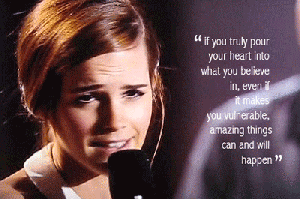 portunity after finishing Harry Potter to go to college to get an Education because it was something she was passionate about. She started a campaign about feminism because it is something she was passionate about. She devotes her life to charities because it is something she is passionate about. Emma Watson lives her life through what she feels is important to her in the world.
portunity after finishing Harry Potter to go to college to get an Education because it was something she was passionate about. She started a campaign about feminism because it is something she was passionate about. She devotes her life to charities because it is something she is passionate about. Emma Watson lives her life through what she feels is important to her in the world.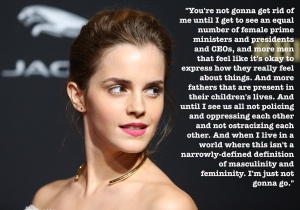 Emma Watson saw a change she wanted to make, so she launched a campaign to raise awareness for women’s rights around the world. At such a young age she has made a large impact by making her voice heard and helping others all over the world. She also has worked with the United Nations to help make her voice heard.
Emma Watson saw a change she wanted to make, so she launched a campaign to raise awareness for women’s rights around the world. At such a young age she has made a large impact by making her voice heard and helping others all over the world. She also has worked with the United Nations to help make her voice heard. 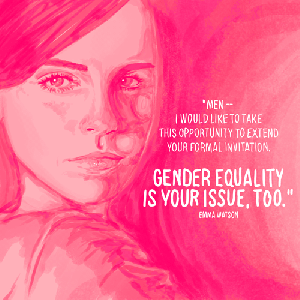
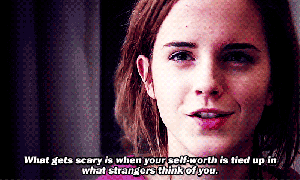 Emma Watson prides herself on being her own person an loving that is different. In fact, she wants everyone else to love themselves too. She focuses her opinion on herself based solely on her own view of herself and not on what others may think. She lives by the motto that she isn’t giving others or society the control to determine what she thinks of herself. This is a goal that I want to one day achieve and I think it is one of the most admirable traits of Emma Watson.
Emma Watson prides herself on being her own person an loving that is different. In fact, she wants everyone else to love themselves too. She focuses her opinion on herself based solely on her own view of herself and not on what others may think. She lives by the motto that she isn’t giving others or society the control to determine what she thinks of herself. This is a goal that I want to one day achieve and I think it is one of the most admirable traits of Emma Watson.

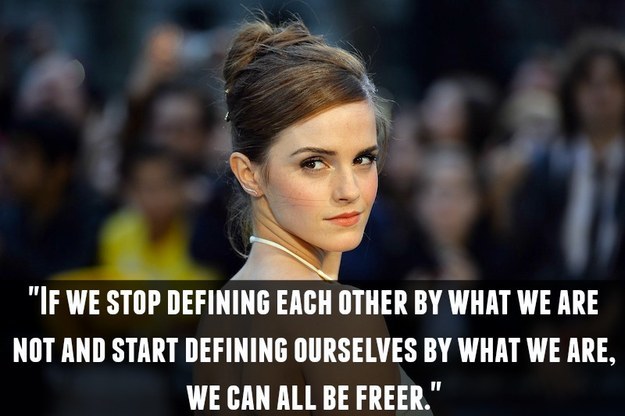
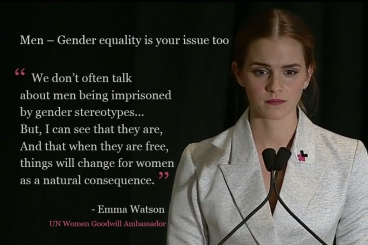




 racters where we were each assigned a character from the Goblet of Fire and were told to interact with each right after *SPOILER ALERT* Cedric is killed by Lord Voldemort! I was Cho Chang, so I could vent about how upset I was to everyone except for Amos(Cedric’s dad) and Harry. However, the only two people who could vent to me were Amos and Harry. This is more difficult in real life because it is harder to identify who is truly closer to a situation. The “Comfort in, Dump out” ideology is a very useful method with having healthy relationships and learning how to be a source of comfort for others.
racters where we were each assigned a character from the Goblet of Fire and were told to interact with each right after *SPOILER ALERT* Cedric is killed by Lord Voldemort! I was Cho Chang, so I could vent about how upset I was to everyone except for Amos(Cedric’s dad) and Harry. However, the only two people who could vent to me were Amos and Harry. This is more difficult in real life because it is harder to identify who is truly closer to a situation. The “Comfort in, Dump out” ideology is a very useful method with having healthy relationships and learning how to be a source of comfort for others.